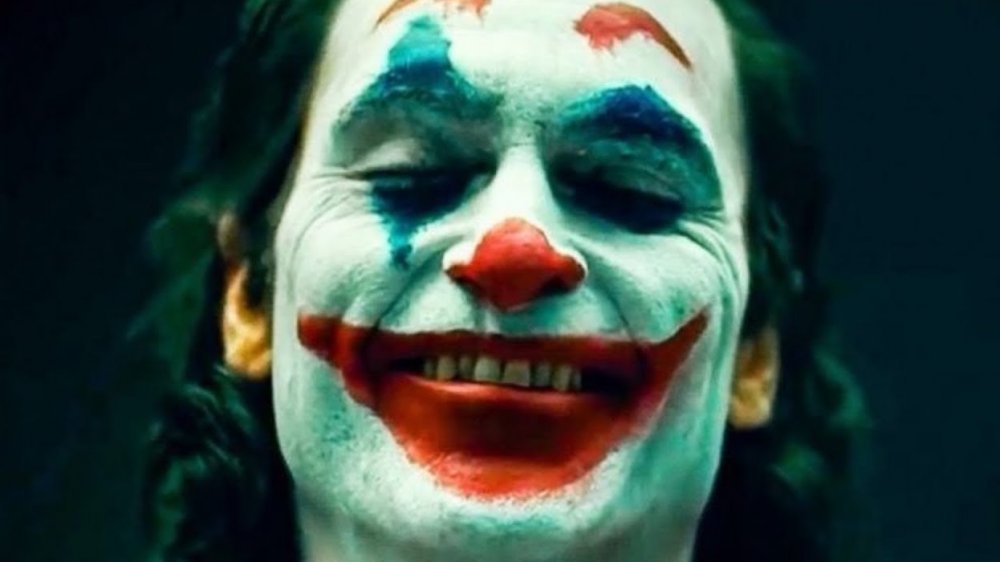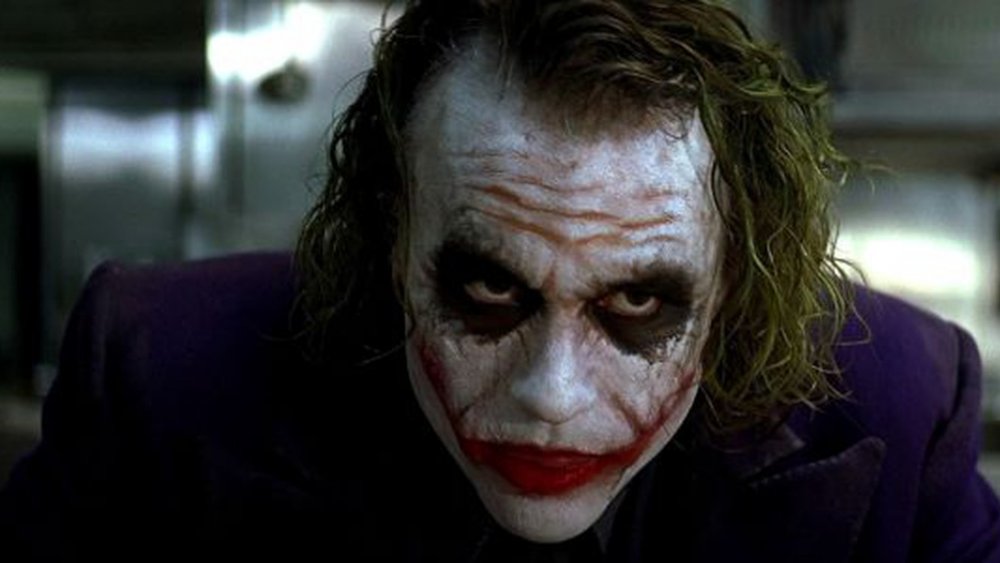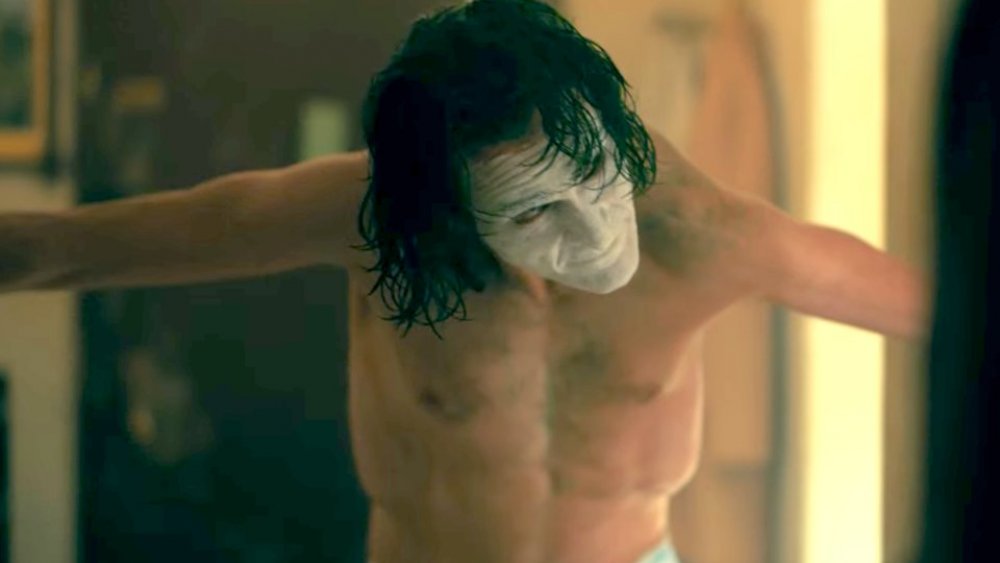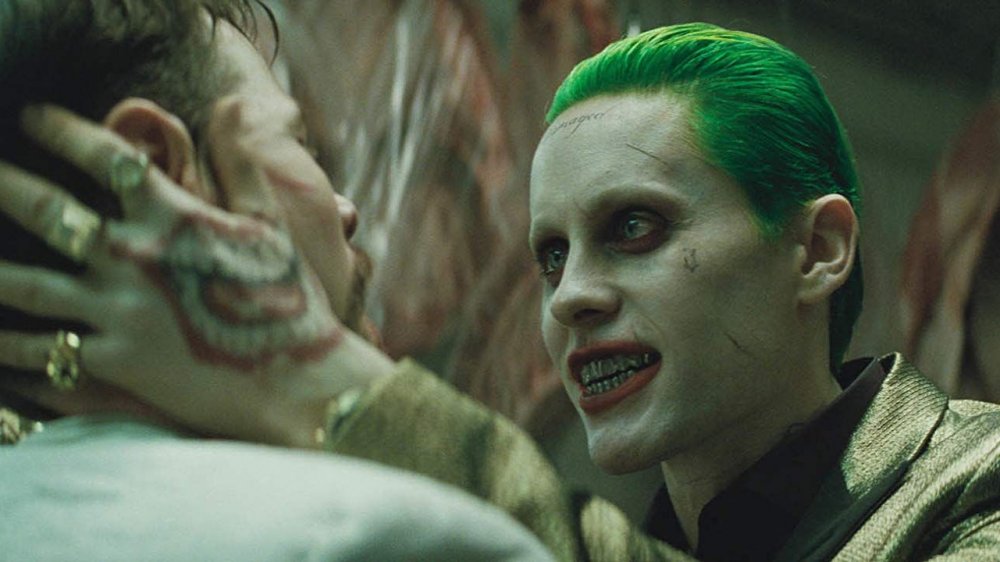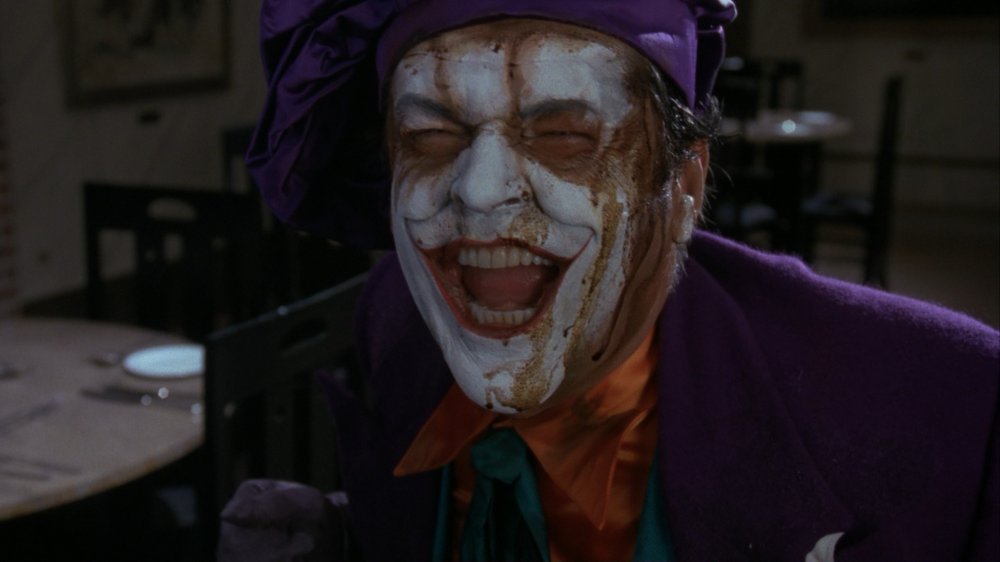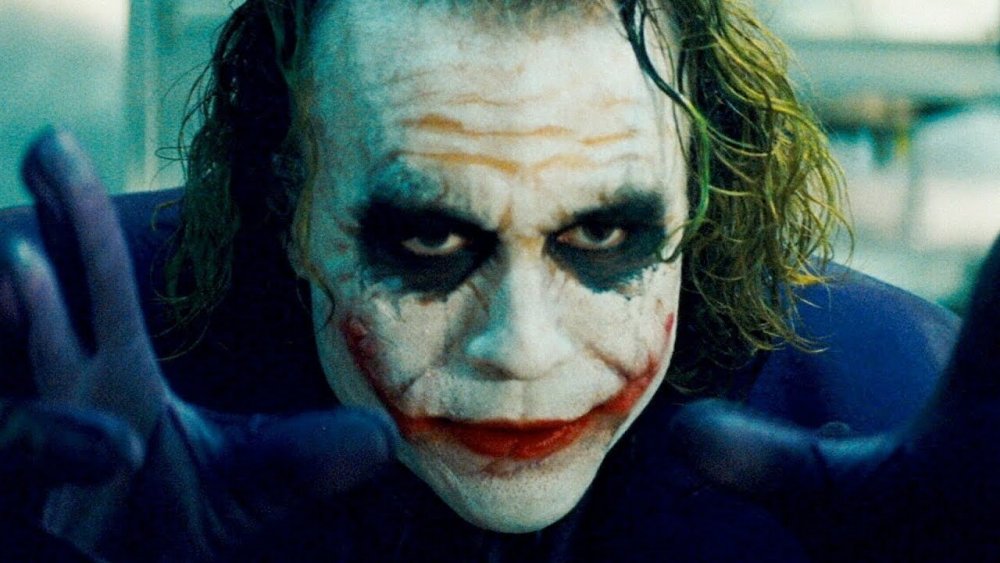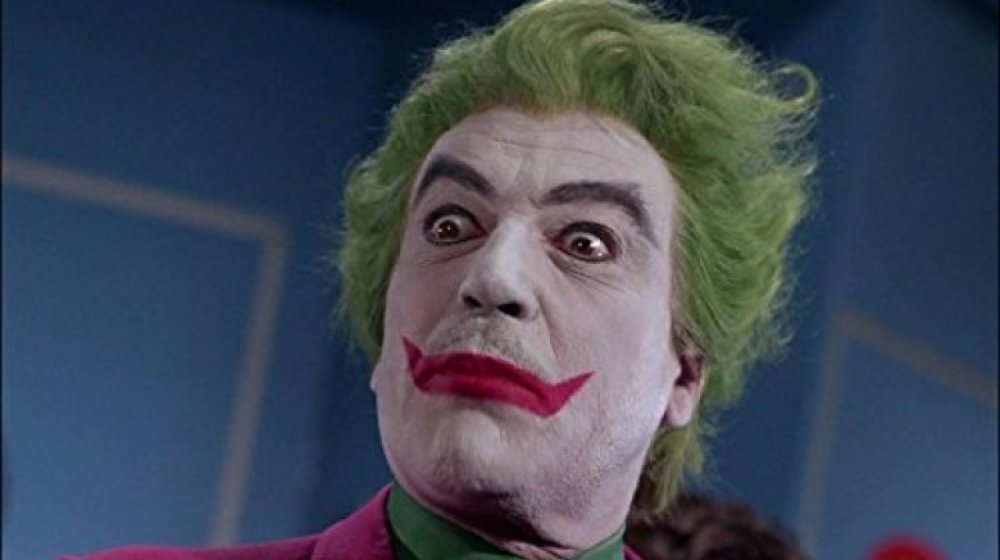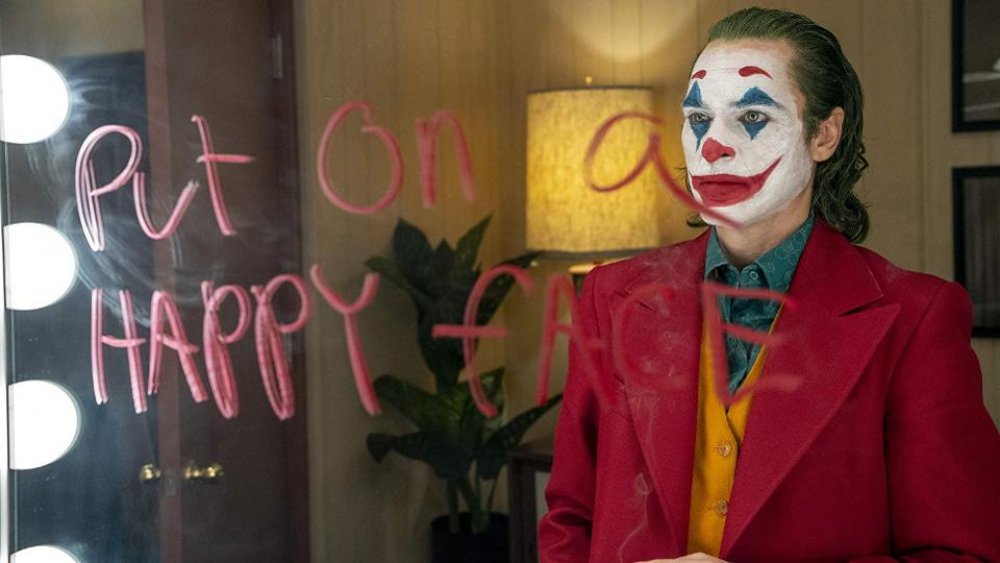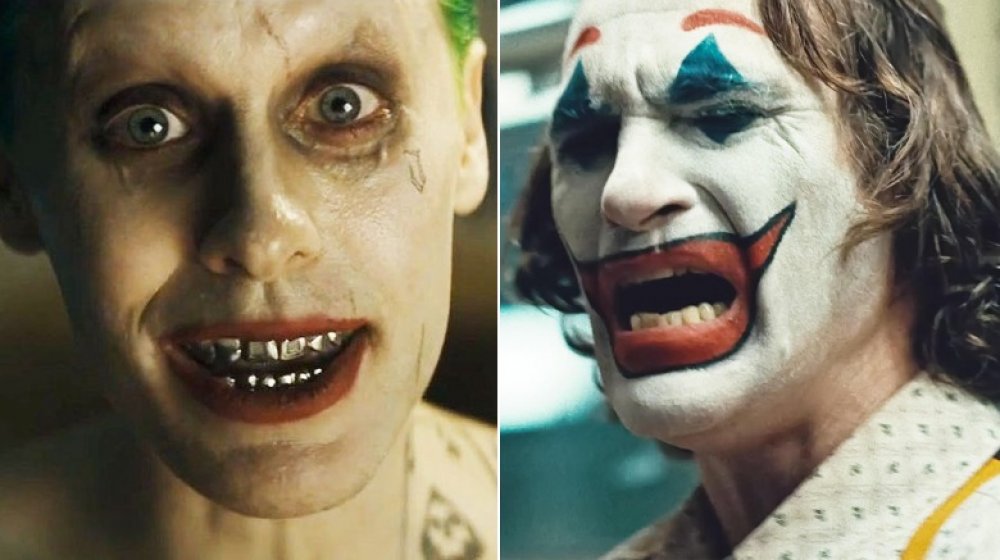Why Is The Joker Such A Dangerous Role To Play?
The Joker has become so iconic in popular culture, some argue that when it comes to the number of different actors who've left and will continue to leave their mark on the character, he's the new Hamlet. Just as it is with the tragic Prince of Denmark, while the Joker remains completely recognizable in every version, each actor leaves a distinct mark on the role. For example, consider how differently the various actors who've played the Joker manifest his chilling laughter. Joaquin Phoenix of 2019's Joker gives us what usually seems like an involuntary laugh, something he's described as "almost painful." On the other hand, Mark Hamill — who's voiced the Joker in multiple animated TV shows, films, and video games — says he didn't want his Joker "to have just one laugh," but rather that "it should be like the colors on a palette where it reflects his mood."
Just as each actor leaves his mark, the Joker leaves his mark on them. As fun as the role can be, it's proven challenging for many, including forcing them to face physical and mental dangers. Heath Ledger's tragic death before the release of 2008's The Dark Knight is the most well-known example, as many still believe the role contributed to his death. But Ledger's not the first or last actor to put himself in harm's way to play the Joker. Let's take a look at why this is such a dangerous role to play.
Playing the Joker can take a horrible psychological toll
Heath Ledger's tragic death at the age of 28 led many to at least partly blame the psychological stress of playing the Joker in 2008's The Dark Knight. The stories that have since surfaced lend some credence to the theory. In the 2016 German documentary Heath Ledger: Too Young to Die, Ledger's father Kim revealed the actor's "Joker" diary, which ends ominously with "BYE BYE." Ledger's father said his son spent weeks in a hotel room preparing for the role. Once filming started, Ledger said that while he ended every day exhausted, he couldn't get to sleep without help.
"I couldn't stop thinking," Ledger said. "My body was exhausted and my mind was still going." Ledger used Ambien to force himself to sleep, but still only slept "an average of two hours a night." After his death, a half-dozen different kinds of prescription drugs were found in his system, two of which are classified as sleeping meds.
We know Ledger isn't the only Joker actor to report paying a high mental toll for the part. Jared Leto said he took a "pretty deep dive" into the role for 2016's Suicide Squad and that, while it was fun, it was also "very painful, like giving birth." Jack Nicholson has never expanded upon his cryptic response to the news of Ledger's death, but it begs for details. Asked for comment by reporters in London, Nicholson — who played the Joker in 1989's Batman — said simply, "Well, I warned him."
Playing the Joker can be physically harmful
While it's usually the psychological stress of playing the Joker that people talk about, the physical toll is just as precarious and often makes the mental health part of things that much more difficult to handle.
As soon as the first trailers for 2019's Joker surfaced, it was clear Joaquin Phoenix had lost a dangerous amount of weight for the role, which he confirmed. At the 2019 Venice Film Festival, Phoenix said the weight loss was the first thing he addressed in preparing for the film. Between his first discussions with director Todd Phillips and the filming of Joker, Phoenix lost a dramatic 52 pounds. "[A]s it turns out, that then affects your psychology," Phoenix said. "You start to go mad when you lose that amount of weight in that amount of time."
Heath Ledger experienced his own physical hardships filming The Dark Knight — even beyond the physical exhaustion that he said "absolutely wrecked" him. Speaking to THR months before Ledger's death, Dark Knight co-star Christian Bale praised Ledger for his commitment to the role. In particular, he described the scene in which Batman beats Joker in a police interrogation room, claiming Ledger insisted Bale hit him for real. Bale went on to describe Ledger "slamming himself around, and there were tiled walls inside of that set which were cracked and dented from him hurling himself into them."
Playing the Joker tends to be isolating
Jared Leto was dangerously isolated while filming Suicide Squad. A year before the movie hit theaters, Will Smith — who plays the assassin Deadshot in the film — said something that sounds downright insane without context. "I've never actually met Jared Leto," Smith said. "We worked together for six months and we've never exchanged a word outside of 'Action!' and 'Cut!' I literally have not met him yet... He was all in on the Joker."
With Suicide Squad, Leto took the strategy of method acting seriously, reportedly staying in character as Joker for the entire shoot and infamously sending bizarre and troubling gifts to his co-stars including bullets, a dead rat, and even some things we'll let you read about if you want but we'd rather not mention. Leto's method of introducing himself to his co-stars was to have a "henchman" deliver a dead pig during rehearsal. In order to get him to show up on set, Assistant Directors had to refer to Leto as "Mr. J."
Through it all, according to Suicide Squad producer Charles Roven, Leto was completely isolated from the rest of the cast. In his case, things seemed to turn out okay, but that doesn't mean he wasn't taking dangerous risks. If his co-stars hadn't taken kindly to his method acting and disturbing gift-giving that resulted, for example, Leto's reputation could have been irreparably harmed, not to mention the lawsuits that could've resulted.
If you're cast as the Joker, you may get too attached to the role
One danger of getting involved in any promising venture is that you won't be able to let it go. Case in point: in 2007, Jack Nicholson was surprisingly candid during an interview with MTV about his response to learning Ledger would be playing the Joker in The Dark Knight.
"I'm furious," Nicholson said. He even admitted casting Ledger might have been the right call, but that didn't change how he felt. "Maybe it was the right thing, but to be candid, I'm furious." Nicholson went on to explain that Joker was a role he admired since his childhood — "It's a part I always thought I should play." Asked if he would see The Dark Knight, Nicholson said probably not, but that he might "catch up with it" if he heard it was good.
While he's very gracious in giving shout outs to other Joker actors, even Mark Hamill admits succumbing to the dangers of owning the Joker role. Speaking with IGN in 2012, Hamill said he'd gotten so protective of the role that he'd taken Joker-related work that didn't pay much simply because he didn't want anyone else doing it. Hamill said when another actor was going to be hired to do the Joker voice for toys, he stepped in and said "Look, I'd rather not let anyone else sleep in my sleeping bag."
Whenever a new Joker is cast, the haters are legion
Heath Ledger's portrayal of the Joker is so well-loved that it seems as soon as The Dark Knight was released, a cloud of amnesia descended upon comic book movie fandom. When it was first announced that Ledger would be playing Batman's most colorful antagonist, the internet did not react well to the news. Fans were just as unhappy then as they would be when they learned in 2013 that Ben Affleck would be playing Batman. That's why, after the internet started screaming over the "Batfleck" news, some sites tried to cool tempers by reminding everyone how nuts they went over Ledger's casting.
Some of the comments Newsarama reposted from Reddit (from users who will likely deny they wrote them until the end of time) include: "Probably the worst casting of all time," "And now begins the second downfall of the Batman series... I hope this is all a joke," and "The Joker is a character that needs an actor with gravity. Not some little twerp who got lucky."
This kind of backlash is a danger faced by any actor cast as Joker in the future. It's practically inevitable.
If you play the Joker, he may dominate your legacy
Every actor who plays their version of Joker wants to be well remembered in the role, but one danger is that it may become the only thing they're remembered for.
Fans of classic film would likely scoff at the notion that Cesar Romero's time as the Joker in the campy TV show Batman and the accompanying 1966 film was the peak of his career. Romero worked in films and TV for over 60 years before his passing in 1994. Along with acting, Romero was a singer and a dancer. Long before he was tapped to play one of Adam West's many goofy nemeses, he appeared in classic flicks like 1960's Ocean's 11, 1947's Captain from Castle, and 1963's Donovan's Reef, just to name a few. For years after the '60s Batman closed it doors, Romero was a regular fixture on TV, including a being series regular on the primetime soap Falcon Crest as billionaire industrialist Peter Stravos.
But to the general public, Cesar Romero's most well-remembered contribution is his time fighting Batman and Robin. As far as we know, Romero wasn't bothered by his legacy. He seemed to enjoy his time on the series, telling an interviewer in 1966 that the role of Joker was "the kind of part where you can do everything you're told not to do... You can be as hammy as you want." But another actor might see such a fate as a more dangerous proposition.
Playing the Joker can be politically controversial
In spite of proving to be a huge commercial success, 2019's Joker faced a danger it didn't expect — controversy.
Months before Joker's release, fears started brewing that the film would be a magnet for yet another tragic mass shooting. In large part this was because for some, Joaquin Phoenix's character, Arthur Fleck, seemed like a perfect onscreen idol for so-called "incels" — i.e. radicalized "involuntary celibate" men — who believe they are owed attention and sex from attractive women, some of whom have been known to celebrate the actions of self-described incel mass shooters. Another reason was because of the 2012 Aurora, Colorado mass shooting during a screening of The Dark Knight Rises. It was widely reported that the shooter identified himself as the Joker, but these reports proved false. Fears were at enough of a peak that the U.S. Army released an official warning to its service members about seeing Joker, and threats were reported around the time of the premiere.
Joaquin Phoenix clearly was not expecting to face this kind of controversy with Joker. In late September 2019, when asked by The Telegraph's Robbie Collin if his work on Joker might inspire a real person to follow in Arthur Fleck's footsteps, Phoenix walked out of the interview. An hour later he returned, saying he'd "panicked" and that he'd never even considered the question.
If you're cast as the Joker, you might find yourself competing with other Jokers
Whether you loved or hated Jared Leto's version of the Joker in 2016's Suicide Squad, you have to admit the actor faced a unique danger in taking ownership of the role — having to compete with a different actor with a radically different interpretation of the character.
Shortly after the release of Joker, stories surfaced that Leto felt "alienated and upset" when he learned Warner Bros. was moving forward with an origin movie. Leto was already disappointed with his reduced screen time in Suicide Squad — something director David Ayer admitted was a mistake — and the Joker news may have exacerbated that frustration. There are unconfirmed reports that Leto did everything he could to stop Joker from happening, including directing his agency to do what they could to kill it, and asking his 30 Seconds to Mars music manager Irving Azoff to pull strings with Warner Bros.
We don't know if these reports are accurate but, if they are, can you really blame Leto for getting upset or allegedly trying to tank the film? If you have trouble feeling empathy for Leto, imagine if right after 2011's Thor was released, Marvel Studios called up Tom Hiddleston and said, "Hey, we're doing a Loki origin movie with a completely different actor. Don't worry though, because it's a totally different take on the character that we're hoping wins a gazillion Oscars. Okay, bye!"
